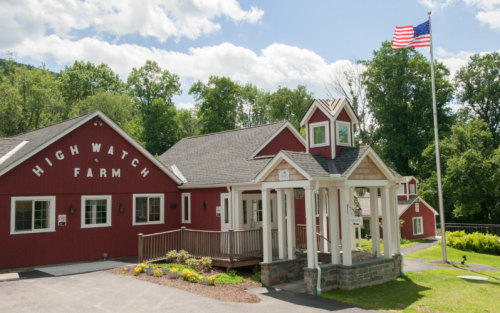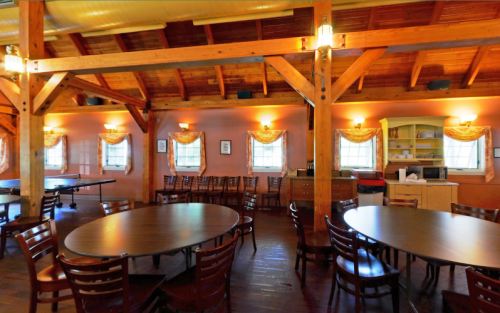






High Watch Recovery Center
Treatment Focus
This center treats substance use disorders and co-occurring mental health conditions. Your treatment plan addresses each condition at once with personalized, compassionate care for comprehensive healing.
Primary Level of Care
Offering intensive care with 24/7 monitoring, residential treatment is typically 30 days and can cover multiple levels of care. Length can range from 14 to 90 days typically.
Claimed
Recovery.com has connected directly with this treatment provider to validate the information in their profile.
Treatment Focus
This center treats substance use disorders and co-occurring mental health conditions. Your treatment plan addresses each condition at once with personalized, compassionate care for comprehensive healing.
Primary Level of Care
Offering intensive care with 24/7 monitoring, residential treatment is typically 30 days and can cover multiple levels of care. Length can range from 14 to 90 days typically.
Provider's Policy
We accept insurance.
High Watch Recovery Center
High Watch Recovery Center
About High Watch Recovery Center
High Watch Recovery Center was established in 1939 as the world’s first 12-Step treatment center. Since then, High Watch has led thousands of clients from the grip of alcohol and drug addiction to the freedom of recovery. They offer inpatient, intervention services, an extended care program, IOP, transitional sober living for women, and aftercare support. For clients who require a more flexible schedule, High Watch additionally offers online Telehealth IOP and AA meetings. Each client in the inpatient program receives an individual bio-psycho-social evaluation to create an customized treatment plan that’s right for their needs. Each client is assigned an experienced 12-Step coach to work with in a one on one setting. High Watch has an Empowering Women in Recovery group designed to help women recognize and honor their strength and resiliency and explore ways to parlay those into their recovery journey. Topics include breaking the chain of low self-esteem, increasing self-care, practicing boundary setting, and addressing the specific challenges women in recovery face. High Watch also has a 50+ group to discuss the unique challenges clients 50 and older face in life and recovery such as relationships with adult children and grandchildren, loss of spouses, retirement, health related issues which are part of the aging process, facing one’s own mortality, and how they view their future. Finally, High Watch has a Relationships in Recovery group designed to provide clients the opportunity to explore how to make and maintain healthy relationships.
Nestled on 200 wooded acres in the lush Litchfield Hills of Connecticut, High Watch Recovery Center is a residential medical facility that provides state-of-the-art treatment for substance abuse disorders and co-occurring psychiatric disorders. High Watch’s cozy home has comfortable bedrooms and common areas and a fitness center. Outside, clients will find an abundance of roaming space amongst the Connecticut greenery. Equine therapy is provided on-site at their stable to improve impulse control, accountability, responsibility, self-confidence, stress tolerance, problem solving skills, and self-control. High Watch is Joint Commission accredited, an NAATP member, and LegitScript certified. They accept private insurance.

Center Overview
Treatment Focus
This center treats substance use disorders and co-occurring mental health conditions. Your treatment plan addresses each condition at once with personalized, compassionate care for comprehensive healing.
Joint Commission Accredited
The Joint Commission accreditation is a voluntary, objective process that evaluates and accredits healthcare organizations (like treatment centers) based on performance standards designed to improve quality and safety for patients. To be accredited means the treatment center has been found to meet the Commission's standards for quality and safety in patient care.
Insurance Accepted
Cash Pay Rates
Estimated Cash Pay Rate
Center pricing can vary based on program and length of stay. Contact the center for more information. Recovery.com strives for price transparency so you can make an informed decision.
Levels of Care






Your Care Options
Specializations
Alcohol
Using alcohol as a coping mechanism, or drinking excessively throughout the week, signals an alcohol use disorder.
Co-Occurring Disorders
A person with multiple mental health diagnoses, such as addiction and depression, has co-occurring disorders also called dual diagnosis.
Drug Addiction
Drug addiction is the excessive and repetitive use of substances, despite harmful consequences to a person's life, health, and relationships.
Who We Treat
Approaches
Holistic
A non-medicinal, wellness-focused approach that aims to align the mind, body, and spirit for deep and lasting healing.
Twelve Step
Incorporating spirituality, community, and responsibility, 12-Step philosophies prioritize the guidance of a Higher Power and a continuation of 12-Step practices.
Therapies
1-on-1 Counseling
Patient and therapist meet 1-on-1 to work through difficult emotions and behavioral challenges in a personal, private setting.
Meditation & Mindfulness
A practiced state of mind that brings patients to the present. It allows them to become fully aware of themselves, their feelings, and the present moment.
Art Therapy
Visual art invites patients to examine the emotions within their work, focusing on the process of creativity and its gentle therapeutic power.
Equine Therapy
Guided interactions with trained horses, their handler, and a therapist can help patients improve their self-esteem, trust, empathy, and social skills.
Family Therapy
Family therapy addresses group dynamics within a family system, with a focus on improving communication and interrupting unhealthy relationship patterns.
Recreation Therapy
In recreation therapy, recovery can be joyful. Patients practice social skills and work through emotional triggers by engaging in fun activities.
Twelve Step Facilitation
12-Step groups offer a framework for addiction recovery. Members commit to a higher power, recognize their issues, and support each other in the healing process.
Yoga
Yoga is both a physical and spiritual practice. It includes a flow of movement, breathing techniques, and meditation.
Conditions We Treat
Anxiety
Anxiety is a common mental health condition that can include excessive worry, panic attacks, physical tension, and increased blood pressure.
Bipolar
This mental health condition is characterized by extreme mood swings between depression, mania, and remission.
Depression
Symptoms of depression may include fatigue, a sense of numbness, and loss of interest in activities. This condition can range from mild to severe.
Post Traumatic Stress Disorder
PTSD is a long-term mental health issue caused by a disturbing event or events. Symptoms include anxiety, dissociation, flashbacks, and intrusive thoughts.
Trauma
Some traumatic events are so disturbing that they cause long-term mental health problems. Those ongoing issues can also be referred to as "trauma."
Substances We Treat
Alcohol
Using alcohol as a coping mechanism, or drinking excessively throughout the week, signals an alcohol use disorder.
Benzodiazepines
Benzodiazepines are prescribed to treat anxiety and sleep issues. They are highly habit forming, and their abuse can cause mood changes and poor judgement.
Co-Occurring Disorders
A person with multiple mental health diagnoses, such as addiction and depression, has co-occurring disorders also called dual diagnosis.
Cocaine
Cocaine is a stimulant with euphoric effects. Agitation, muscle ticks, psychosis, and heart issues are common symptoms of cocaine abuse.
Drug Addiction
Drug addiction is the excessive and repetitive use of substances, despite harmful consequences to a person's life, health, and relationships.
Heroin
Heroin is a highly addictive and illegal opioid. It can cause insomnia, collapsed veins, heart issues, and additional mental health issues.
Methamphetamine
Methamphetamine, or meth, increases energy, agitation, and paranoia. Long-term use can result in severe physical and mental health issues.
Opioids
Opioids produce pain-relief and euphoria, which can lead to addiction. This class of drugs includes prescribed medication and the illegal drug heroin.
Languages
Aftercare
Care Designed for Your Needs
Personal Amenities
Amenities
Special Considerations
Gender-specific groups
Patients in gender-specific groups gain the opportunity to discuss challenges unique to their gender in a comfortable, safe setting conducive to healing.
Activities
Off-Site Activities
Off-Site Amenities
What people are saying
Treatment
4.5
Accommodations
4.6
Food & Nutrition
4.8
Value
4.7
Margaret
Reviewed 12/04/21
Review from Rehabs.com
JC
Reviewed 06/20/23
Review from Rehabs.com
Luca I
Reviewed 06/21/18
Review from Rehabs.com
AC
Reviewed 03/25/18
Review from Rehabs.com
S.B.
Reviewed 05/28/19
Review from Rehabs.com





